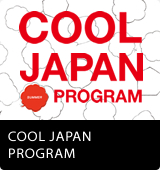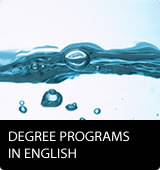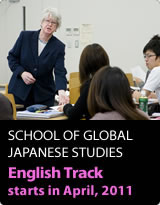News
Former Soviet President Gorbachev conferred with honorary doctorate Special forum on The Future of the World 20 Years on from the End of the Cold War ( 2009.12.25 )
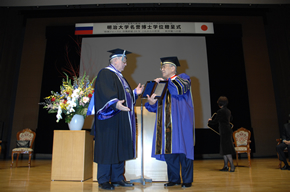
On December 10th 2009, the former president of the Soviet Union Mikhail Gorbachev, who currently chairs the Gorbachev Foundation, was conferred with an honorary doctorate at Meiji University.
To mark the milestone that is the 20th anniversary since the ending of the Cold War, Mr. Gorbachev was invited to speak at Meiji University’s special forum on The Future of the World 20 Years on from the End of the Cold War – the Path to Nuclear Disarmament, and at the same time Mr. Gorbachev was recognized for his active role in promoting nuclear disarmament and his contribution in bringing the Cold War to an end, by awarding him with an honorary doctorate.
On awarding Mr. Gorbachev, University President Hiromi Naya, said it was a great honor to Meiji University to be able to confer Mr. Gorbachev, a former Soviet president and Nobel Peace Prize laureate, with an honorary doctorate. University President Naya also said he hoped this could trigger stronger bilateral relations between Japan and Russia, and that mutual understanding and amicability between the two countries could reach a deeper level.
Following this, Morihiro Nagahori, who is the Chairman of the Board of Trustees of Meiji University gave a congratulatory address to Mr. Gorbachev. When accepting his honorary doctorate, Mr. Gorbachev said it was a major honor to receive an award from such a world renowned university as Meiji University, and that he would promote stronger ties between Meiji University and the Gorbachev Foundation.
After the presentation ceremony, the special international forum entitled The Future of the World 20 Years on from the End of the Cold War – the Path to Nuclear Disarmament was held at the Surugadai Academy Hall.
At the opening of the forum, in his keynote speech Vice Minister for Foreign Affairs Mr. Tetsuro Fukuyama said he had a great deal of respect for Mr. Gorbachev’s peaceful stance, since nuclear disarmament and non-proliferation is one of the central themes in Japan’s diplomacy, as having been the only country to have suffered a nuclear attack it takes a leading role in this area.
In his keynote address, Mr. Gorbachev said we should try to put a human face on the rapidly progressing process of globalization, and he also alluded to the worldwide economic crisis which has gripped the world since the autumn of 2008. He said that Western capitalism had been overcome by a tsunami of inertia, and he pointed out that a period of perestroika, or restructuring, was now necessary.
Mr. Gorbachev said that while he naturally supported the nuclear disarmament movement, he was fervent in his assertion that even after we become a world without nuclear weapons, nothing will change if one country such as the United States has an arsenal of conventional weapons completely different in scale to other countries. He said this should act as a wakeup call to construct a whole new framework for world peace.
Mr. Gorbachev also participated in the panel discussion which followed the speeches. The panel discussion was chaired by Ichiyo Ishikawa, a member of NHK’s commentary committee, and featured Yasushi Akashi who is the former Under Secretary General of the United Nations and currently the chairman of the non-profit Japan Center for Conflict Prevention, Masahiko Shibayama who is a member of the House of Representatives, the writer Masaru Sato, and Professor Tsuyoshi ITO of Meiji University’s School of Political Science and Economics. The panel had an insightful discussion on such issues as the current state of Japan-Russia relations and the security of Japan under Prime Minister Yukio Hatoyama’s Democratic Government.
Second year students at Meiji University’s School of Political Science and Economics who were present at the forum gave us their opinions on the forum. One student said that as a citizen of the only country to have suffered a nuclear attack, he was interested in the nuclear issue. He said to directly hear the political opinions of a Russian leader gave him food for thought. Another student said that she had only heard of troubles between the various ethnic groups of Russia on the news, and that being in the presence of such a peaceful man as Mr. Gorbachev had changed her opinion of Russia.
Meiji University awards honorary doctorates to people who are deemed to have made a noteworthy contribution to others in the academic and artistic realm. Mr. Gorbachev is the 24th person to have received the award, following on from He Zhenliang, the Honorary President of the Chinese Olympic Committee, who was conferred with his honorary doctorate from Meiji University in September 2007.
Profile of Mikhail Gorbachev
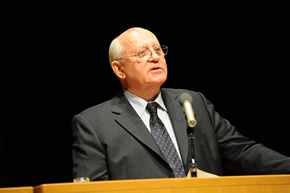
Born in Russia in 1931. Graduated from Moscow State University with a degree in law. Joined the Communist Party of the Soviet Union in 1955, became the First Party Secretary of the Stavropol Kraikom, and in 1971 was made a member of the Communist Party Central Committee. He was later promoted to the Politburo, became the General Secretary of the Communist Party, the Chairman of the Supreme Soviet of the Soviet Union, and President of the Soviet Union in 1990. In 1990 he was also awarded the Nobel Peace Prize. Since 1991 he has remained active in politics.






